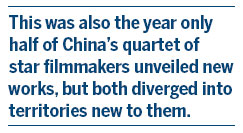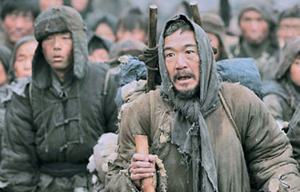Will the silver screen shine?
Updated: 2013-01-04 10:03
By Raymond Zhou (China Daily)
|
||||||||
This was also the year only half of China's quartet of star filmmakers unveiled new works, but both diverged into territories new to them.
Feng Xiaogang, known for his romantic comedies, put his heart and soul into a historical tragedy that was more a labor of love than an inducement for investment. (Huayi Brothers saw its stock price drop as the movie did not draw as big a crowd as a typical Feng laughfest.)

Chen Kaige scaled down his usual grand vision to focus on a Web-induced intrusion of privacy, but Caught in the Web failed to make the first round as China's submission to the Academy Awards in the best foreign language film category.
It was the second-tier filmmakers - those in their 40s - who collectively suffered the greatest setback. The Last Supper by Lu Chuan; Guns N' Roses by Ning Hao; 11 Flowers by Wang Xiao-shuai; Full Circle by Zhang Yang; Inseparable by Dayyan Eng; and White Deer Plain by Wang Quan'an - among others - were dealt financial blows. And most did not get a critical nod either.
If they were brought down by their overreaching ambitions to shoot for both art and profit, the younger generation has been more unadulterated in their goal. They grew up with Hollywood and Hong Kong fare, and showed dedication to telling a good story first and foremost.
Million Dollar Crocodile by Lin Lisheng, First Time by Han Yan and To Forgive by Zhu Minjiang are all debut features that glittered with potential yet were drowned out without making a ripple.
The movies of 2012 that enjoyed the best word-of-mouth turned out to be "outsiders": A Simple Life from Hong Kong and Warriors of the Rainbow from Taiwan opened in their own markets in 2011 and arrived in the mainland in 2012.
Ironically, the simple tale of a maid in her senior years achieved box-office gold while the bloody saga of aboriginals battling foreign colonialists was given the warm embrace but not the purse string.
The biggest surprise hit is from Hollywood. Ang Lee's Life of Pi rode a tidal wave of unparalleled reviews to put the director in a god-like pantheon.
Industry-wise, Chinese companies started to invest in Hollywood projects en masse. A sure sign of Chinese participation is supporting roles by Chinese actresses. The Expendables 2, Cloud Atlas, Iron Man 3 and Looper - among others - had Chinese money behind them. But they failed to be categorized as official co-productions (and therefore enjoy the much higher cut of box-office revenues), because their Chinese participation in cast and narrative was deemed insufficient.
In 2013, the Chinese market is expected to open even wider for imports.
Will official intervention in scheduling keep the domestic industry afloat (above the 50 percent watermark, that is)? Will more big-budget releases follow in the footsteps of the sequel of Painted Skin or Life of Pi in pursuing their 3-D dreams? Will genre projects chase bigger stars or better stories? Will the domestic industry shake off its image of shoddy quality for a quick buck?
And a crucial question not yet alluded to: Will small art-house films find a space for mere survival in this cut-throat environment?
The battle offscreen is often fiercer and more innovative.
Contact the writer at raymondzhou@chinadaily.com.cn.
- 'The Avengers' the Biggest Movie of 2012 Worldwide
- S. Korean actress Jeon Ji-hyun promotes movie "The Thieves" in Taipei
- "Silver Linings Book" of U.S. dominates movie Satellite Awards
- Turkish artists protest demolishing historic movie theatre in Istanbul
- Foreign films puts pressure on Chinese movie market

 'Taken 2' grabs movie box office crown
'Taken 2' grabs movie box office crown
 Rihanna's 'Diamonds' tops UK pop chart
Rihanna's 'Diamonds' tops UK pop chart
 Fans get look at vintage Rolling Stones
Fans get look at vintage Rolling Stones
 Celebrities attend Power of Women event
Celebrities attend Power of Women event
 Ang Lee breaks 'every rule' to make unlikely new Life of Pi film
Ang Lee breaks 'every rule' to make unlikely new Life of Pi film
 Rihanna almost thrown out of nightclub
Rihanna almost thrown out of nightclub
 'Dark Knight' wins weekend box office
'Dark Knight' wins weekend box office
 'Total Recall' stars gather in Beverly Hills
'Total Recall' stars gather in Beverly Hills
Most Viewed
Editor's Picks

|

|

|

|

|

|
Today's Top News
Boston bombing suspect reported cornered on boat
7.0-magnitude quake hits Sichuan
Cross-talk artist helps to spread the word
'Green' awareness levels drop in Beijing
Palace Museum spruces up
First couple on Time's list of most influential
H7N9 flu transmission studied
Trading channels 'need to broaden'
US Weekly

|

|









